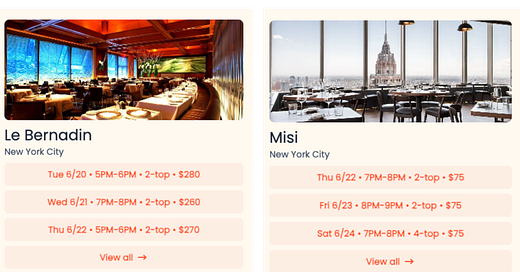It’s been an interesting year or so. Let’s check in on some of the big ideas in (or approaching) the rearview mirror:
MrBeast Burger showed us what a celeb-backed virtual restaurant brand could be.
I was sipping on an extremely strong signature blue cocktail at a restaurant inside the Planet Hollywood casino in Las Vegas the first time I met Robert Earl, co-founder of Virtual Dining Concepts, the company behind MrBeast Burger. But before he and his co-founders took on virtual celebrity brands, he had decades of experience at Planet Hollywood, the legendary celebrity brand he launched decades before I became a restaurant technology writer. Clearly, there’s a market here.
But the virtual restaurant business is new, and Virtual Dining Concepts’ partnership with MrBeast was an early high-water mark. Its wildly popular namesake, who’s basically redefined the look of online creator success, helped the concept scale to thousands of locations, fast.
That speed and scale might be the brand’s downfall. In his deleted tweets, Jimmy Donaldson (that’s MrBeast) lamented his inability to control the quality of food produced by thousands of partner restaurants. VDC hasn’t said what the future holds for the concept — an exec declined to comment when I asked on Monday. But is there really a MrBeast Burger without MrBeast?
Nextbite needed scale.
It’s a decidedly rough time for the virtual brand business. After taking significant investment and, later, enduring a couple rounds of layoffs, Nextbite recently split itself in two, selling the business to new owners. An Indian tech company got the Ordermark business, which offered software to help manage multiple digital ordering channels. And notable entrepreneur and restaurateur Sam Nazarian got the virtual restaurant brands.
In March, Nextbite launched a celeb-based concept, TenderFix by Noah Schnapp, out of 1,000 IHOP locations. It was the third concept Nextbite launched with the pancake purveyor, and spoke to the logistical challenges of building a real-life restaurant brand on the internet. In past conversations, Nextbite co-founder and CEO Alex Canter touted the potential for small restaurants to partner with Nextbite to optimize unused kitchen space, but the brands needed lots of kitchens — like on the magnitude that only a large chain could provide — to succeed.
There’s a lesson in here, and it’s that ghost kitchens are dying (as a recent Bloomberg op-ed stated) — the idea itself isn’t bad. Instead, it’s the execution. In this case: elevated scale, valuation, and expectations created an untenable situation. Be a restaurant, be a tech company, but it’s nearly impossible to be both.



